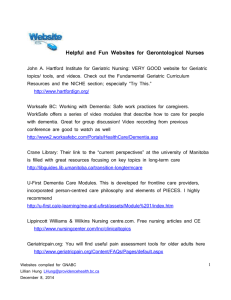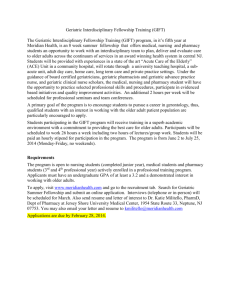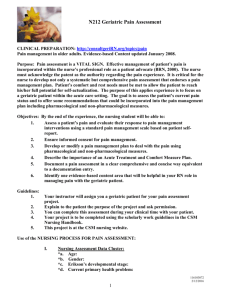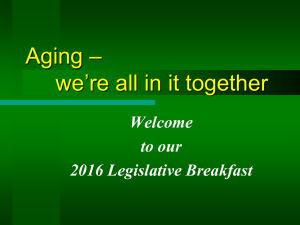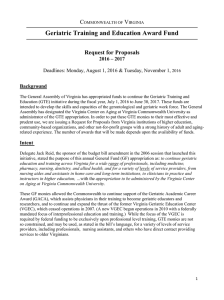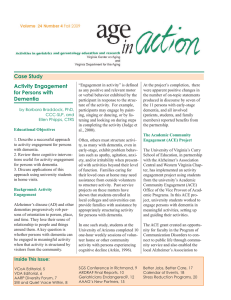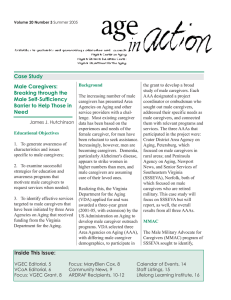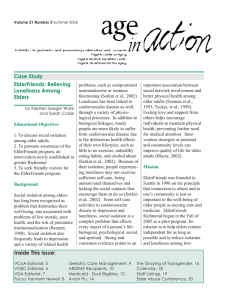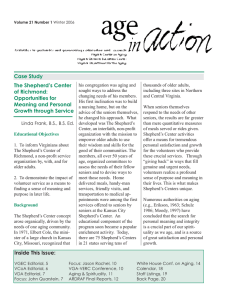Spring 2008 By Edward F. Ansello, Ph.D.
advertisement
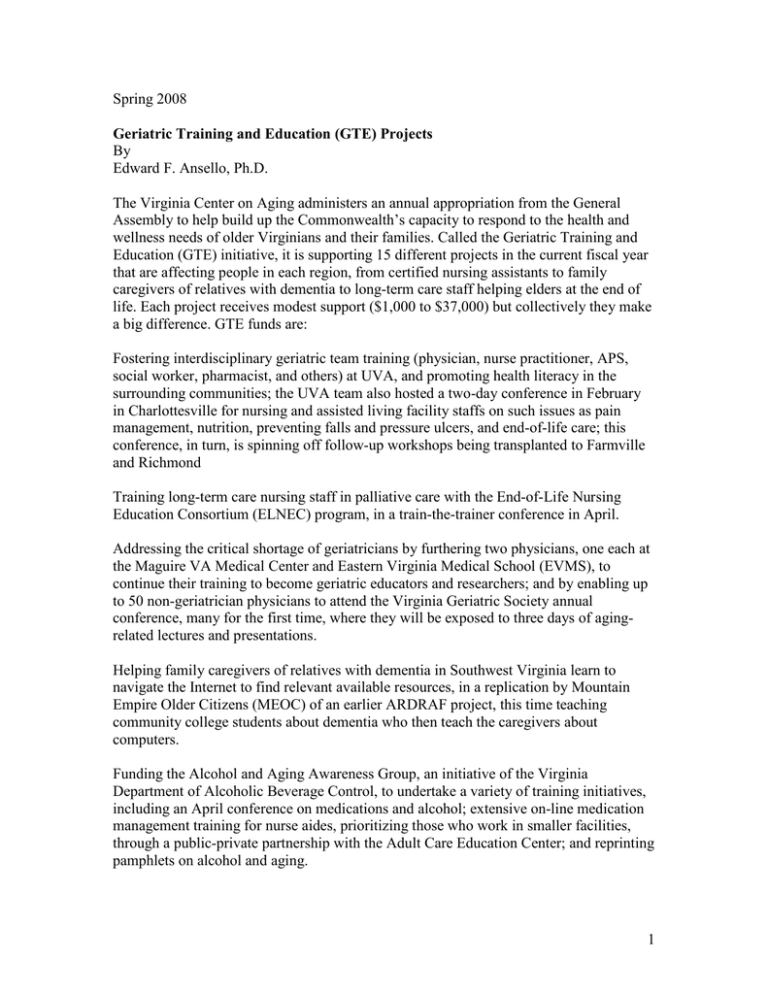
Spring 2008 Geriatric Training and Education (GTE) Projects By Edward F. Ansello, Ph.D. The Virginia Center on Aging administers an annual appropriation from the General Assembly to help build up the Commonwealth’s capacity to respond to the health and wellness needs of older Virginians and their families. Called the Geriatric Training and Education (GTE) initiative, it is supporting 15 different projects in the current fiscal year that are affecting people in each region, from certified nursing assistants to family caregivers of relatives with dementia to long-term care staff helping elders at the end of life. Each project receives modest support ($1,000 to $37,000) but collectively they make a big difference. GTE funds are: Fostering interdisciplinary geriatric team training (physician, nurse practitioner, APS, social worker, pharmacist, and others) at UVA, and promoting health literacy in the surrounding communities; the UVA team also hosted a two-day conference in February in Charlottesville for nursing and assisted living facility staffs on such issues as pain management, nutrition, preventing falls and pressure ulcers, and end-of-life care; this conference, in turn, is spinning off follow-up workshops being transplanted to Farmville and Richmond Training long-term care nursing staff in palliative care with the End-of-Life Nursing Education Consortium (ELNEC) program, in a train-the-trainer conference in April. Addressing the critical shortage of geriatricians by furthering two physicians, one each at the Maguire VA Medical Center and Eastern Virginia Medical School (EVMS), to continue their training to become geriatric educators and researchers; and by enabling up to 50 non-geriatrician physicians to attend the Virginia Geriatric Society annual conference, many for the first time, where they will be exposed to three days of agingrelated lectures and presentations. Helping family caregivers of relatives with dementia in Southwest Virginia learn to navigate the Internet to find relevant available resources, in a replication by Mountain Empire Older Citizens (MEOC) of an earlier ARDRAF project, this time teaching community college students about dementia who then teach the caregivers about computers. Funding the Alcohol and Aging Awareness Group, an initiative of the Virginia Department of Alcoholic Beverage Control, to undertake a variety of training initiatives, including an April conference on medications and alcohol; extensive on-line medication management training for nurse aides, prioritizing those who work in smaller facilities, through a public-private partnership with the Adult Care Education Center; and reprinting pamphlets on alcohol and aging. 1 Training rural pharmacists in advanced medication therapy management (MTM) for geriatric populations, through approved continuing education programs conducted by the VCU School of Pharmacy in and near the Northern Neck, Eastern Shore, Danville, and Emporia. Assisting the Central Virginia Task Force on Domestic Violence in Later Life, a cooperative affiliation of agencies, to obtain technical help with website development in order to increase member and public awareness of available resources. Supporting the Area Planning and Services Committee (APSC) for Aging with Lifelong Disabilities in conducting two workshops for service providers, family caregivers, and consumers, one on diabetes with lifelong disabilities, last November, and one on arthritis with lifelong disabilities, in April. Improving teamwork and communication skills within new inter-setting teams of hospital and nursing home staffs in order to better elders’ transitions between these levels of care; the Virginia Health Quality Center (VHQC) is using a proven training tool, TeamSTEPPS, developed by the federal Agency for Healthcare Research and Quality and the Department of Defense. Addressing long-term care environments in a statewide conference this summer for facilities, hosted by the V4A and the Virginia Culture Change Coalition, with subsequent mini-conferences in other sites focusing on components of this conference. Reaching older Virginians with arthritis through an Arthritis Foundation public awareness campaign with complementary exercise training in Richmond and Williamsburg. Offering four two-hour web-based training teleconferences statewide in geriatric social work, whose content will become continuing education modules. Training physicians in the Tidewater area to recognize and report medically at-risk older drivers, e.g., those who with sleep apnea, multiple medications, dementia, by means of video instructional materials developed by EVMS. We can be justly proud that the governor and the General Assembly have the foresight to encourage these initiatives and that these funds have been put to such productive use. 2
